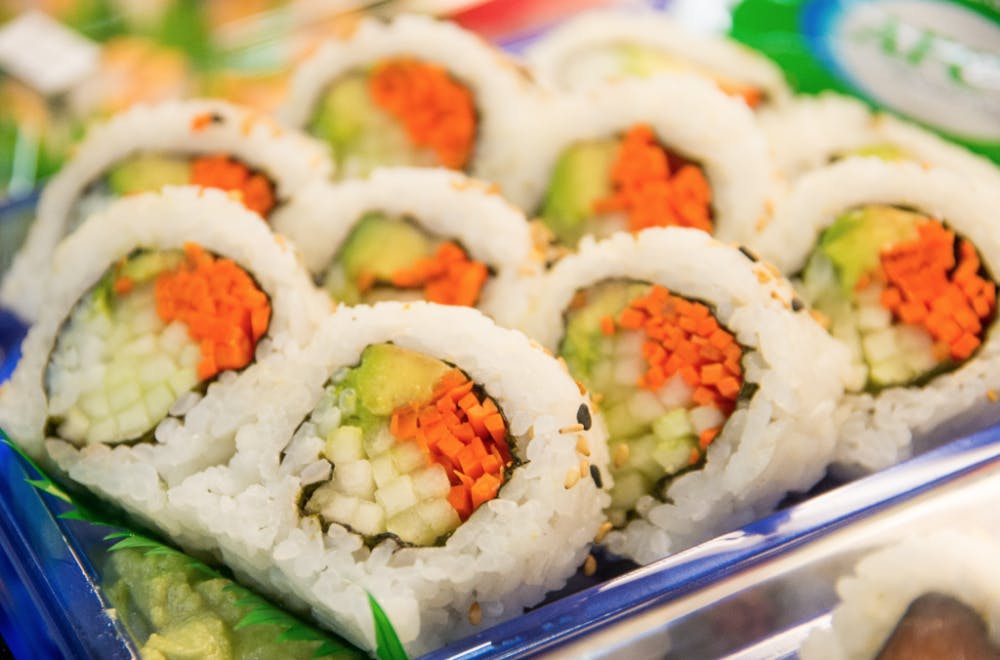The day is Wednesday. The time is 12 p.m. For those passing through the Mattin Center, Bamboo Café offers a convenient lunch stop with a variety of Asian dishes. Some order their bahn mi sandwiches to go, others sit among friends to enjoy a bowl of steaming hot jook, a Korean-style porridge dish that was recently added to the menu.
Tables and chairs within the space are well used, to the point that some of the metal tables have become wobbly. Diners often overflow onto sofas lining the walls, eating out of their laps as the few proper tables have long been taken. The place is a hive of activity, a picture of many coming together to share in one of life’s greatest pleasures — food.
Many who pass through the doors of Bamboo Café do not see the hours of preparation behind the scenes. The team starts sushi preparation at 3 a.m,, making enough for not just Bamboo Café but also Levering Kitchens and Charles Street Market. It is not an easy feat to produce fresh sushi at a large scale. Some have voiced distant hopes during past dining meetings that Bamboo Café can expand their selection and compete with (frankly overpriced) places like Niwana. The fact that Bamboo Café now offers aburi style sushi, a form of nigiri sushi torched with an open flame, is a testament to how far it has come in its two short years of existence here on the Hopkins campus.
The two main actors behind this well-oiled machine are Michael Kang and Joseph Kim, although both will remind you that it is really a team effort. Diners are probably familiar with Kim, known by many as “Jo.” One can easily recognize his outsized and friendly personality, either behind the counter or in the kitchen. His name has come up during dining meetings as “the friendly manager” and he can often be seen interacting with diners. His presence has created a sense of community within the space.
Diners are less likely to have met Kang. Having founded Sushico (the company behind Bamboo Café) in 2001, he holds accounts with over 30 customers, including the U.S. Capitol Visitor Center and the U.S. Senate. Kang is a veteran of the business, having been in the industry since 1987. He is based in Virginia, leaving the running of Bamboo Café to Kim, a vice president of Sushico since 2013.
Our aim is always “top quality,” shares Kim, as part of a broader mission to achieve “better service and better quality.” Kim also mentioned how his background as a foreign student in the United Kingdom has given him increased empathy for those transitioning to college, giving him a better understanding of students’ challenges in a foreign environment.
Prior to joining the Bamboo Café team, Kim was the CEO of a government service contractor. One reason that he transitioned to the private sector was the prospect of being able to work with students as part of this “Hopkins family.” Being part of a family also involves giving back, and Bamboo Café has contributed towards community building events such as the well-received make-your-own-sushi nights. On one occasion, Kang and Kim even had sushi boxes prepared beforehand so participants would not go hungry while waiting for their turn to learn how to make a sushi roll, reflecting a sincere dedication toward service.
This place is Bamboo Café, where people are family and committed to always improving. Possibilities toward an even better dining experience are numerous. A hopeful change would be the revamping of the physical space with the inclusion of more tables to foster communal dining. Such a move would cement Bamboo Café as a key hub of student interaction within Hopkins Dining’s new focus on “meet, dine, community.”
Tommy Koh is a junior Political Science and Psychology double major from Singapore. This piece is part of a biweekly feature titled “Change and Continuity: Insights into our Hopkins Community.”





